2018人教版九年级英语Unit3单元同步测试题有详解
- 格式:doc
- 大小:2.02 MB
- 文档页数:11
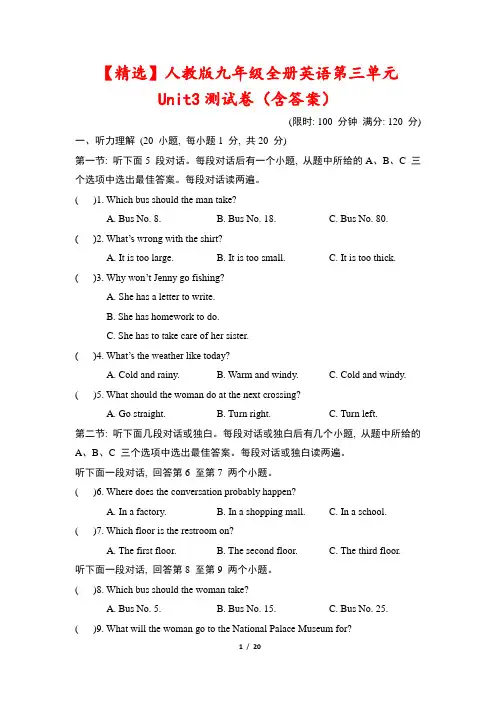
【精选】人教版九年级全册英语第三单元Unit3测试卷(含答案)(限时: 100 分钟满分: 120 分) 一、听力理解(20 小题, 每小题1 分, 共20 分)第一节: 听下面5 段对话。
每段对话后有一个小题, 从题中所给的A、B、C 三个选项中选出最佳答案。
每段对话读两遍。
( )1. Which bus should the man take?A. Bus No. 8.B. Bus No. 18.C. Bus No. 80. ( )2. What’s wrong with the shirt?A. It is too large.B. It is too small.C. It is too thick. ( )3. Why won’t Jenny go fishing?A. She has a letter to write.B. She has homework to do.C. She has to take care of her sister.( )4. What’s the weather like today?A. Cold and rainy.B. Warm and windy.C. Cold and windy. ( )5. What should the woman do at the next crossing?A. Go straight.B. Turn right.C. Turn left.第二节: 听下面几段对话或独白。
每段对话或独白后有几个小题, 从题中所给的A、B、C 三个选项中选出最佳答案。
每段对话或独白读两遍。
听下面一段对话, 回答第6 至第7 两个小题。
( )6. Where does the conversation probably happen?A. In a factory.B. In a shopping mall.C. In a school.( )7. Which floor is the restroom on?A. The first floor.B. The second floor.C. The third floor.听下面一段对话, 回答第8 至第9 两个小题。
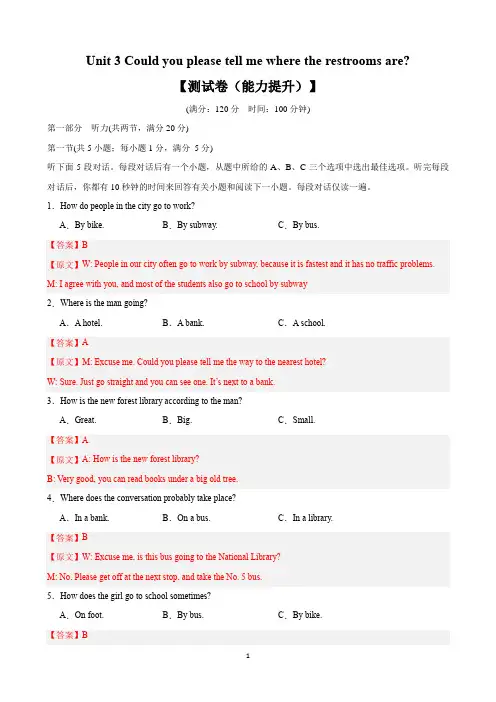
Unit 3 Could you please tell me where the restrooms are?【测试卷(能力提升)】(满分:120分时间:100分钟)第一部分听力(共两节,满分20分)第一节(共5小题;每小题1分,满分5分)听下面5段对话。
每段对话后有一个小题,从题中所给的A、B、C三个选项中选出最佳选项。
听完每段对话后,你都有10秒钟的时间来回答有关小题和阅读下一小题。
每段对话仅读一遍。
1.How do people in the city go to work?A.By bike.B.By subway.C.By bus.【答案】B【原文】W: People in our city often go to work by subway, because it is fastest and it has no traffic problems. M: I agree with you, and most of the students also go to school by subway2.Where is the man going?A.A hotel.B.A bank.C.A school.【答案】A【原文】M: Excuse me. Could you please tell me the way to the nearest hotel?W: Sure. Just go straight and you can see one. It’s next to a bank.3.How is the new forest library according to the man?A.Great.B.Big.C.Small.【答案】A【原文】A: How is the new forest library?B: Very good, you can read books under a big old tree.4.Where does the conversation probably take place?A.In a bank.B.On a bus.C.In a library.【答案】B【原文】W: Excuse me, is this bus going to the National Library?M: No. Please get off at the next stop, and take the No. 5 bus.5.How does the girl go to school sometimes?A.On foot.B.By bus.C.By bike.【答案】B【原文】M: How do you go to school every day, Amy?W: I usually go to school by bike. Sometimes I will take a bus instead of riding a bike when it rains.第二节(共10小题;每小题1分,满分10分)听下面5段对话。
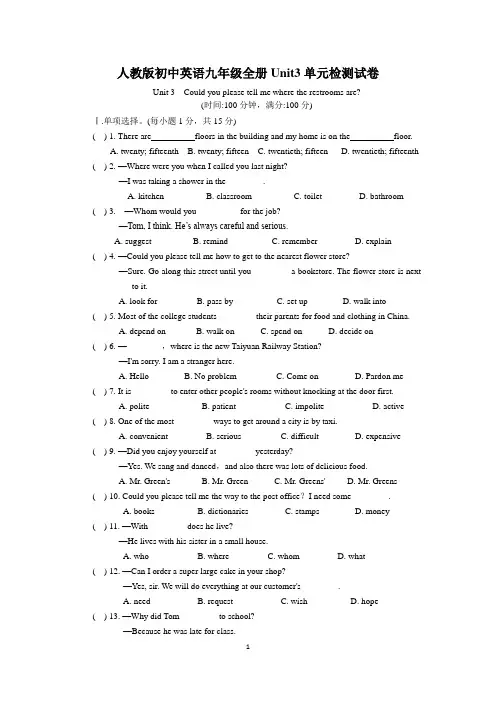
人教版初中英语九年级全册Unit3单元检测试卷Unit 3Could you please tell me where the restrooms are?(时间:100分钟,满分:100分)Ⅰ.单项选择。
(每小题1分,共15分)( ) 1. There are floors in the building and my home is on the floor.A. twenty; fifteenthB. twenty; fifteenC. twentieth; fifteenD. twentieth; fifteenth ( ) 2. —Where were you when I called you last night?—I was taking a shower in the ________.A. kitchenB. classroomC. toiletD. bathroom ( ) 3. —Whom would you for the job?—Tom, I think. He’s always careful and serious.A. suggestB. remindC. rememberD. explain ( ) 4. —Could you please tell me how to get to the nearest flower store?—Sure. Go along this street until you ________ a bookstore. The flower store is next to it.A. look forB. pass byC. set upD. walk into( ) 5. Most of the college students ________ their parents for food and clothing in China.A. depend onB. walk onC. spend onD. decide on( ) 6. —________,where is the new Taiyuan Railway Station?—I'm sorry. I am a stranger here.A. HelloB. No problemC. Come onD. Pardon me ( ) 7. It is ________ to enter other people's rooms without knocking at the door first.A. politeB. patientC. impoliteD. active ( ) 8. One of the most ________ ways to get around a city is by taxi.A. convenientB. seriousC. difficultD. expensive ( ) 9. —Did you enjoy yourself at ________ yesterday?—Yes. We sang and danced,and also there was lots of delicious food.A. Mr. Green'sB. Mr. GreenC. Mr. Greens'D. Mr. Greens ( ) 10. Could you please tell me the way to the post office?I need some ________.A. booksB. dictionariesC. stampsD. money( ) 11. —With ________ does he live?—He lives with his sister in a small house.A. whoB. whereC. whomD. what( ) 12. —Can I order a super large cake in your shop?—Yes, sir. We will do everything at our customer's ________.A. needB. requestC. wishD. hope( ) 13. —Why did Tom ________ to school?—Because he was late for class.A. rushB. requestC. acceptD. repeat( ) 14. Which of the following sentence is more polite?A. How old are you?B. My pen doesn't work. Give me yours.C. I have no time to help you.D. Could you let me know your phone number? ( ) 15. —Could you please pass me the book?— ________.A. Yes,I couldB. No,I couldn'tC. Sure. Here you areD. No,that's no problemⅡ.完形填空。
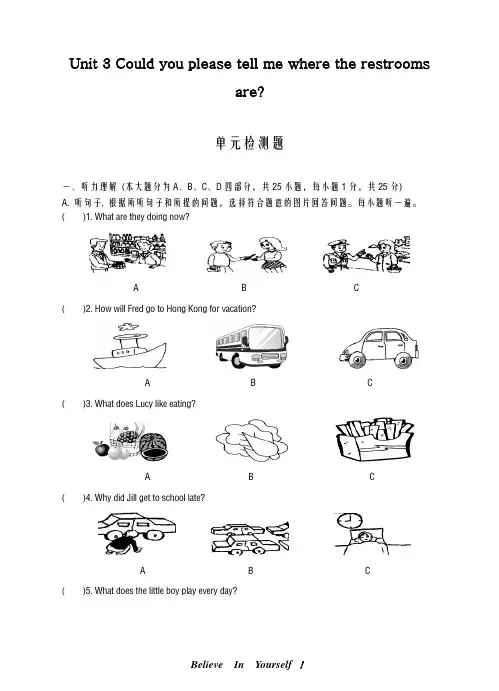
Unit 3 Could you please tell me where the restroomsare?单元检测题一、听力理解(本大题分为A、B、C、D四部分,共25小题,每小题1分,共25分)A. 听句子, 根据所听句子和所提的问题,选择符合题意的图片回答问题。
每小题听一遍。
( )1. What are they doing now?A B C( )2. How will Fred go to Hong Kong for vacation?A B C( )3. What does Lucy like eating?A B C( )4. Why did Jill get to school late?A B C( )5. What does the little boy play every day?A B CB. 听对话,根据所听对话的内容和所提的问题,在各题所给的三个选项中选出一个最佳选项。
每段对话听两遍。
听第一段对话,回答第6小题。
( )6. What’s wrong with John?A. He is tired.B. He isn’t feeling well.C. He is hungry.听第二段对话,回答第7小题。
( )7. How many children are there in the classroom?A. Three.B. Two.C. Five.听第三段对话,回答第8小题。
( )8. How often does the boy watch TV?A. Twice a week.B. Three times a week.C. Once a week.听第四段对话,回答第9小题。
( )9. Where are the two speakers?A. At home.B. In the hospital.C. At school.听第五段对话,回答第10小题。
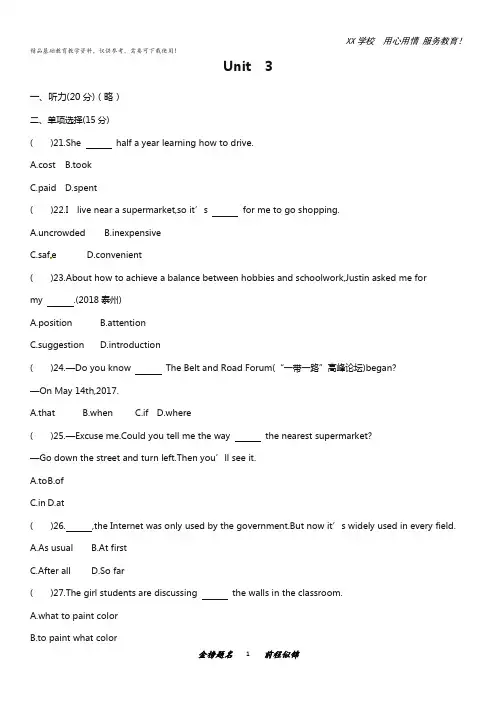
精品基础教育教学资料,仅供参考,需要可下载使用!Unit 3一、听力(20分)(略)二、单项选择(15分)( )21.She half a year learning how to drive.A.costB.tookC.paidD.spent( )22.I live near a supermarket,so it’s for me to go shopping.A.uncrowdedB.inexpensiveC.saf eD.convenient( )23.About how to achieve a balance between hobbies and schoolwork,Justin asked me formy .(2018泰州)A.positionB.attentionC.suggestionD.introduction( )24.—Do you know The Belt and Road Forum(“一带一路”高峰论坛)began?—On May 14th,2017.A.thatB.whenC.ifD.where( )25.—Excuse me.Could you tell me the way the nearest supermarket?—Go down the street and turn left.Then you’ll see it.A.toB.ofC.inD.at( )26. ,the Internet was only used by the government.But now it’s widely used in every field.A.As usualB.At firstC.After allD.So far( )27.The girl students are discussing the walls in the classroom.A.what to paint colorB.to paint what colorC.which color to paintD.to paint which color( )28.—I’ll not be Jack’s friend any more.—Don’t be angry.He’s just so ,but in fact he’s good to us,you know.A.helpfulB.directC.politeD.brave( )29.I look forward you soon.A.seeB.seeingC.to seeD.to seeing( )30.—Excuse me.Could you please tell me ?—Sure.Go along this street and turn left.It’s on your right.A.when I can get to the bookstoreB.when can I get to the bookstoreC.how I can get to the bookstoreD.how can I get to the bookstore( )31.There is a bank the second floor.A.atB.onC.inD.with( )32.—Would you like a movie with us tonight?—I’d like to,but I have to help my mother do some chores.A.seeB.seeingC.to seeD.to seeing( )33.Tom didn’t go to bed he finished his homework last night. A.because B.if C.until D.while( )34.Our teacher told us carefully in class.A.to listenB.listenC.listeningD.listened( )35.We should speak to the old .A.politeB.politelyC.impoliteD.impolitely三、完形填空(10分)Few words are spoken more often every day on the streets of Britain than “I’m sorry”.This sentence has become 36 common that it has had a lot of meanings.Sorry means apologizing (道歉).It’s 37 to understand.We learn it both as a mother language speaker and as a 38 .B ut in Britain,it has another meaning.It is a cultural expression. 39 this situation:a man walks down the street,looking down a t his phone.A woman is walking in the opposite direction,towards the man.She sees him, 40 she can’t get out of the way in time.The man walks 41 the woman.Who should say sorry? Naturally,the man should say sorry,because he isn’t looking at42 he is going.Yet in Britain,it is common for both to apologize.It is 43 that British people,like most people,do not enjoy conflicts (冲突).So to calm (使平静) the situation soon,British people will apologize to 44 .Sometimes it may sound funny to hear “sorry”.In Britain,sorry doesn’t always mean 45 what you think.Some of my friends say it at restaurants,as they ask the waiter,“Sorry,but can I order another drink?”It is not to apologize,but just to express that we need the waiter.( )36.A.very B.suchC.soD.too( )37.A.easy B.difficultC.differentD.interesting( )38.A.neighbor B.customerC.writerD.foreigner( )39.A.Explain B.ImagineC.SayD.Expect( )40.A.as B.soC.butD.or( )41.A.behind B.intoC.aroundD.beside( )42.A.where B.whenC.whyD.how( )43.A.taught B.testedC.knownD.told( )44.A.another B.any otherC.each otherD.others( )45.A.finally B.recentlyC.especiallyD.exactly四、阅读理解(40分)ASome British and American people like to invite friends and colleagues(同事)for a meal at home.You should not be upset if your English friends don’t invite you home.It doesn’t mean they don’t like you. Dinner parties usually start between 7 and 8 p.m.,and end at about 11.Ask your hosts what time you should arrive.It’s polite to bring flowers,chocolates or a bottle of wine as a present.Do you want to be extra(特别地)polite?Say how much you like the room,or the pictures on the wall.But remember not to ask how much things cost.You’ll probably start the meal with soup,or something small as a “starter(开胃菜)”,then you’ll have meat or fish with vegetables,and then a dessert(甜点),followed by coffee.It’s polite to finish everything on your plate and to take more if you want it.Some people eat bread with their meal,but not everyone does. Before they take out their cigarettes after the meal,most p eople usually ask,“Do you mind if I smoke here?”Did you enjoy the evening?Call your hosts the next day,or write them a short “thank you”letter.Perhaps it seems funny to you,but British and American people say “thank you,thank you,and thank you”all the time.( )46.If you aren’t invited to dinner at home by English or American friends,.A.it shows they don’t like youB.it shows they have no time to get togetherC.it shows they don’t want to make friends with youD.it doesn’t show they don’t like you( )47.When your friend invites you to go to his or her home, .A.you shouldn’t take anything with youB.you may take a small present with youC.you may take an expensive present with youD.you may go at any time( )48.In England and America,it’s not polite to .A.ask the price of a thingB.eat all the food on your plateC.talk to your hostsD.eat bread with your meal( )49.In the passage,the order of the serving of a meal is .A.dessert—meat or fish with vegetables—coffee—soupB.coffee—soup—dessert—meat or fish with vegetablesC.meat or fish with vegetables—dessert—soup—coffeeD.soup—meat or fish with vegetables—dessert—coffee( )50.Which is NOT right?A.In England or America,it usually takes about three or four hours to have a dinner party at home.B.If you are invited to go to a dinner party,you can bring flowers.C.You mustn’t smoke after a m eal when you are with some American or English people.D.If you enjoy the evening,you can write a short “thank you”letter to your hosts or call them.BOn a cold early morning,an old woman was carrying a big basket of cabbages on her head to the market.She hoped to sell them to the people in the town.The mountain road was narrow (狭窄) and the old woman was walking carefully,because she did not want to lose her cabbages.Suddenly she heard a loud bell and a bicycle came round.It passed her and went very fast down the hill.The old woman had to jump up to one side of the road so quickly that the basket of cabbages nearly fell into the valley(山谷).She looked down,and saw that a young boy was on the bicycle.He was riding on without even looking round to see whether the old woman was all right.The old woman began to shout,“Come back,young man! You dropped something!”When he heard this,the boy stopped the bicycle so suddenly that he nearly fell off.Then he turned and began to push the bicycle back up to the hill.“What is it?”he asked.“What did I drop?”“Little boy,”the old woman answered,“you dropped your manners.”( )51.What was the old woman carrying?A.A basket of eggs.B.A basket of pears.C.A basket of apples.D.A basket of cabbages.( )52.Why did the woman go to the town?A.Because she went to see her son.B.Because she went to buy cabbages.C.Because she went to sell her cabbages.D.Because she went to buy a bicycle.( )53.What was the mountain road like?A.The mountain road was wide.B.The mountain road was narrow.C.The mountain road was long.D.The mountain road was untidy.( )54.Which one is RIGHT according to the passage?A.The boy stopped to buy some cabbages.B.The boy stopped to take the old woman to the town.C.The boy stopped to pick up the cabbages.D.The boy stopped to ask the old woman what he dropped.( )55.What did the boy drop?A.The boy dropped his cabbages.B.The boy dropped his money.C.The boy dropped his manners.D.The boy dropped his books.CI arrived in the UK last weekend to learn English.So far I have already made a few friends and had several kinds of traditional English foods there.But after eating hamburgers,sandwiches and potatoes,I thought none could be more delicious than Chinese food,especially my favorite—huo guo.You can’t imagine how excited I was when I got to know that there was going to be a free meal of hotpot to welcome the new students.On the way to the canteen,I seemed to smell huo guo in the air.To my surprise,when I went into the room,I didn’t see any sign of huo guo.Where was it?With many questions in my head,I sat down to have the free meal.After talking with an English girl,I got to know that Chinese huo guo is completely different from hotpot.Chinese huo guo is written in two words—hot pot,and hotpot,one word,is a traditional English dish.Hotpot is made of mutton and onion.On the top are pieces of potatoes.People put it in the oven all day in a heavy pot on a low heat.It takes very little effort to prepare.You can often see it at parties in the UK because it’s easy to prepare for a large number of people and is not expensive.Hotpot doesn’t taste bad.However,I still miss huo guo—hot pot,two words!( )56.The writer felt excited when she thought she would .A.try traditional English foodB.learn English in the UKC.have her favorite huo guoD.meet some new fr iends( )57.The underlined word “canteen”means “”in Chinese.A.宿舍B.餐厅C.实验室D.体育馆( )58.Why is hotpot often prepared for parties?A.Because it’s easy to prepare.B.Because it’s very popularC.Because it’s quite expensive.D.Because it’s good for health.( )59.After the free meal,the writer learnt that .A.“hotpot”wasn’t “hot pot”B.hotpot took little time to cookC.hotpot wasn’t traditional in the UKD.the girl knew little about hotpot( )60.What is the writer’s favorite food?A.Sandwiches.B.Mutton.C.Hotpot.D.Hot pot.D阅读短文,根据短文内容从短文后的六个选项中选出能填入空白处的最佳选项。
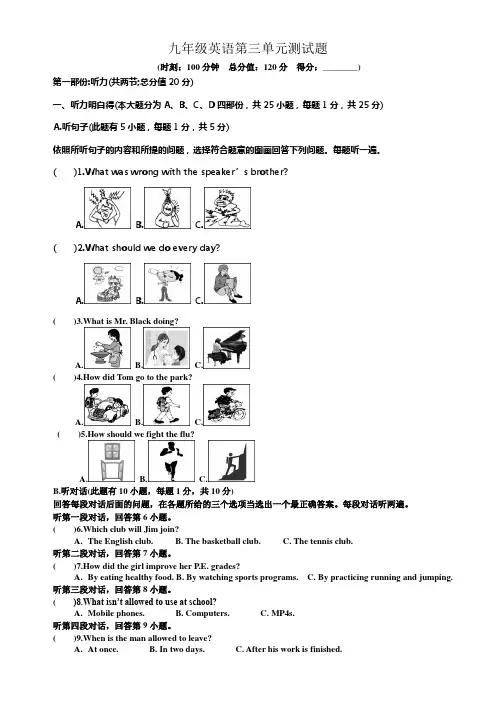
九年级英语第三单元测试题(时刻:100分钟总分值:120分得分:________)第一部份:听力(共两节;总分值20分)一、听力明白得(本大题分为A、B、C、D四部份,共25小题,每题1分,共25分)A.听句子(此题有5小题,每题1分,共5分)依照所听句子的内容和所提的问题,选择符合题意的图画回答下列问题。
每题听一遍。
( )1.What was wrong with the speaker’s brother?A. B. C.( )2.What should we do every day?A. B. C.()3.What is Mr. Black doing?A. B. C.()4.How did Tom go to the park?A. B. C.()5.How should we fight the flu?A. B. C.B.听对话(此题有10小题,每题1分,共10分)回答每段对话后面的问题,在各题所给的三个选项当选出一个最正确答案。
每段对话听两遍。
听第一段对话,回答第6小题。
()6.Which club will Jim join?A.The English club.B. The basketball club.C. The tennis club.听第二段对话,回答第7小题。
()7.How did the girl improve her P.E. grades?A.By eating healthy food.B. By watching sports programs.C. By practicing running and jumping. 听第三段对话,回答第8小题。
()8.What isn’t allowed to use at school?A.Mobile phones.B. Computers.C. MP4s.听第四段对话,回答第9小题。
()9.When is the man allowed to leave?A.At once.B. In two days.C. After his work is finished.听第五段对话,回答第10小题。
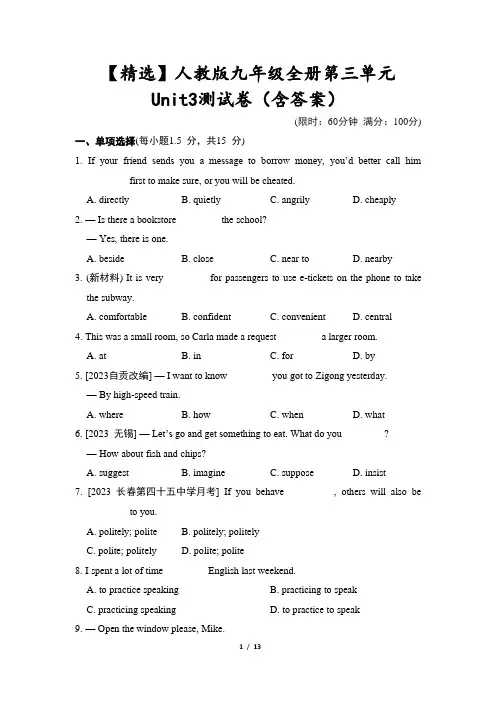
【精选】人教版九年级全册第三单元Unit3测试卷(含答案)(限时:60分钟满分:100分)一、单项选择(每小题1.5 分,共15 分)1. If your friend sends you a message to borrow money, you’d better call him________ first to make sure, or you will be cheated.A. directlyB. quietlyC. angrilyD. cheaply2. — Is there a bookstore ________ the school?— Yes, there is one.A. besideB. closeC. near toD. nearby3. (新材料) It is very ________ for passengers to use e-tickets on the phone to takethe subway.A. comfortableB. confidentC. convenientD. central4. This was a small room, so Carla made a request ________ a larger room.A. atB. inC. forD. by5. [2023自贡改编] — I want to know ________ you got to Zigong yesterday.— By high-speed train.A. whereB. howC. whenD. what6. [2023 无锡] —Let’s go and get something to eat. What do you ________?— How about fish and chips?A. suggestB. imagineC. supposeD. insist7. [2023 长春第四十五中学月考] If you behave ________ , others will also be________ to you.A. politely; politeB. politely; politelyC. polite; politelyD. polite; polite8. I spent a lot of time ________ English last weekend.A. to practice speakingB. practicing to speakC. practicing speakingD. to practice to speak9. — Open the window please, Mike.1/ 13。
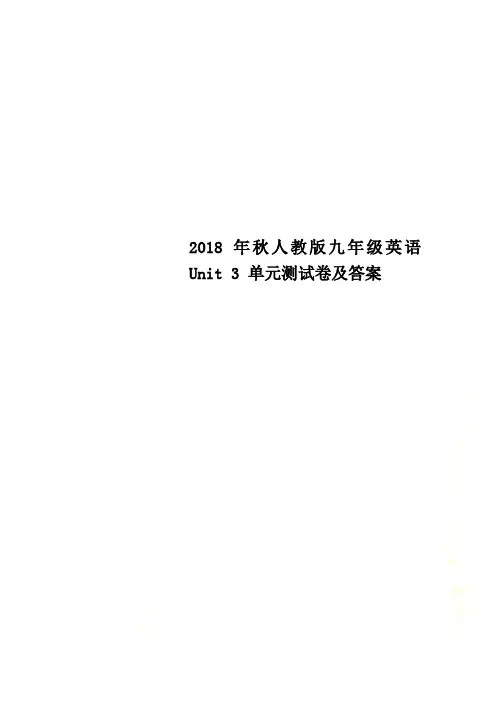
2018年秋人教版九年级英语Unit 3 单元测试卷及答案()6. —Could you tell me I can see theheadmaster?—In Room 308 on the third floor.A. howB. whenC. whereD. what()7. I'm not interested in you'll come or not.A. whenB. whetherC. howD. if()8. Could you tell me the box?I tried,but I just couldn't open it.A. how openB. when openC. how to openD. when to open()9. —Pardon me,could I use your cellphone?A. Sorry,but it's out of power.B. Yes,it is out of power.C. No,it is out of power.D. Of course,it is out of power.()10. Which of the following is NOT a proper request from a stranger?A. Hi,come over and share your umbrella with me.B. Excuse me,could I share your umbrella?C. Pardon me,I was wondering whether I can share yourumbrella.D. Excuse me,may I share your umbrella?Ⅱ. 完形填空。
(3′×10=30′)Anne is a newspaper reporter.She chose this 11so she could travel around the world.The work has taught her many unforgettable lessons.She has seen wars,earthquakes and deaths.But she has 12seen courage,hope and happiness.Last year,she won an award for her reporting in Africa.She was very proud 13it.At first,she thought she got the award because of her good work.But then she realized that she should thank many other people for 14help.Anne was born in Jamaica.Her family was not poor,but it was not 15,either.Her parents had to 16hard so that she could go to school.At school,Anne was not a good student,17 she enjoyed writing because her English teacher said,“Anne,you are a wonderful 18.”The teacher encouraged her all the time.Later,Anne went to university in Canada and then 19for a job.It was very difficult.Then,one day,she went to see the editor of a newspaper in Ottawa.The editor gave her a job.“Everyone needs a 20at first,”he said.()11. A. book B. jobC. classD. picture()12. A. still B. neverC. alsoD. only()13. A. to B. ofC. forD. from()14. A. my B. hisC. ourD. their()15. A. rich B. newC. smallD. big()16. A. study B. walkC. workD. play()17. A. but B. ifC. becauseD. so()18. A. farmer B. nurseC. doctorD. writer()19. A. looked B. madeC. joinedD. found()20. A. ticket B. hobbyC. chanceD. habitⅢ. 阅读理解。
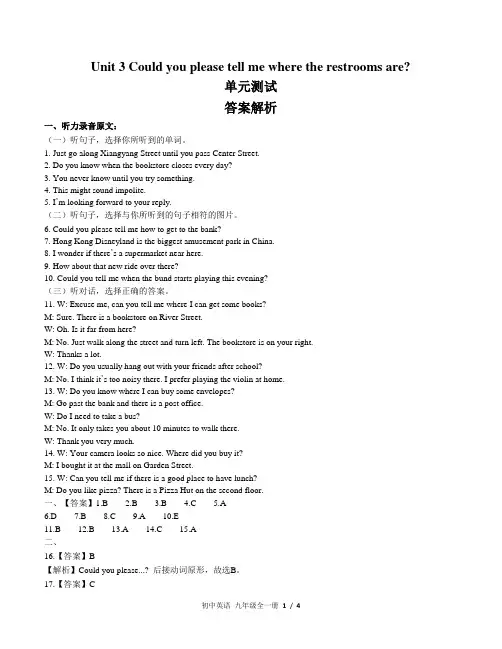
Unit 3 Could you please tell me where the restrooms are?单元测试答案解析一、听力录音原文:(一)听句子,选择你所听到的单词。
1. Just go along Xiangyang Street until you pass Center Street.2. Do you know when the bookstore closes every day?3. You never know until you try something.4. This might sound impolite.5. I’m looking forward to your reply.(二)听句子,选择与你所听到的句子相符的图片。
6. Could you please tell me how to get to the bank?7. Hong Kong Disneyland is the biggest amusement park in China.8. I wonder if there’s a supermarket near here.9. How about that new ride over there?10. Could you tell me when the bund starts playing this evening?(三)听对话,选择正确的答案。
11. W: Excuse me, can you tell me where I can get some books?M: Sure. There is a bookstore on River Street.W: Oh. Is it far from here?M: No. Just walk along the street and turn left. The bookstore is on your right.W: Thanks a lot.12. W: Do you usually hang out with your friends after school?M: No. I think it’s too noisy there. I prefer playing the violin at home.13. W: Do you know where I can buy some envelopes?M: Go past the bank and there is a post office.W: Do I need to take a bus?M: No. It only takes you about 10 minutes to walk there.W: Thank you very much.14. W: Your camera looks so nice. Where did you buy it?M: I bought it at the mall on Garden Street.15. W: Can you tell me if there is a good place to have lunch?M: Do you like pizza? There is a Pizza Hut on the second floor.一、【答案】1.B 2.B 3.B 4.C 5.A6.D7.B8.C9.A 10.E11.B 12.B 13.A 14.C 15.A二、16.【答案】B【解析】Could you please...? 后接动词原形,故选B。
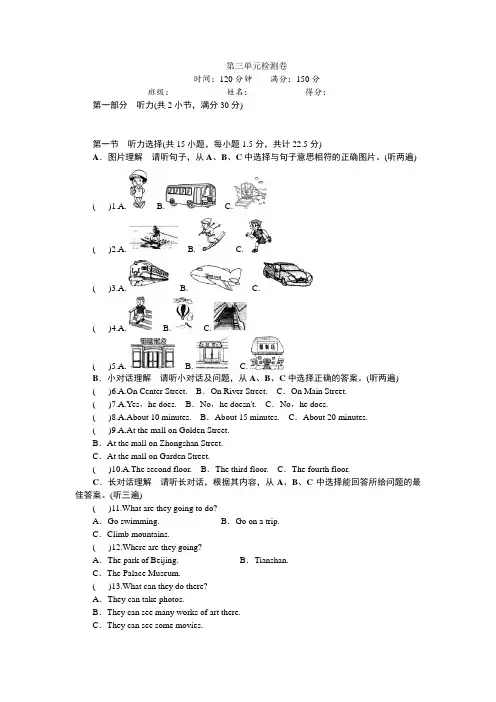
第三单元检测卷时间:120分钟满分:150分班级:________姓名:________得分:________ 第一部分听力(共2小节,满分30分)第一节听力选择(共15小题,每小题1.5分,共计22.5分)A.图片理解请听句子,从A、B、C中选择与句子意思相符的正确图片。
(听两遍) ()1.A. B. C.()2.A. B. C.()3.A. B. C.()4.A. B. C.()5.A. B. C.B.小对话理解请听小对话及问题,从A、B、C中选择正确的答案。
(听两遍)()6.A.On Center Street. B.On River Street. C.On Main Street.()7.A.Yes,he does. B.No,he doesn't. C.No,he does.()8.A.About 10 minutes. B.About 15 minutes. C.About 20 minutes.()9.A.At the mall on Golden Street.B.At the mall on Zhongshan Street.C.At the mall on Garden Street.()10.A.The second floor. B.The third floor. C.The fourth floor.C.长对话理解请听长对话,根据其内容,从A、B、C中选择能回答所给问题的最佳答案。
(听三遍)()11.What are they going to do?A.Go swimming. B.Go on a trip.C.Climb mountains.()12.Where are they going?A.The park of Beijing. B.Tianshan.C.The Palace Museum.()13.What can they do there?A.They can take photos.B.They can see many works of art there.C.They can see some movies.()14.How will they go there?A.By bus. B.By train. C.By underground.()15.What time will they meet?A.At eight. B.At nine. C.At ten.第二节听力填空(共5小题,每小题1.5分,计7.5分)第二部分语言知识运用(共3小节,满分40分)第一节单项选择(共15小题,每小题1分,共计15分)从A、B、C中选出最佳答案。
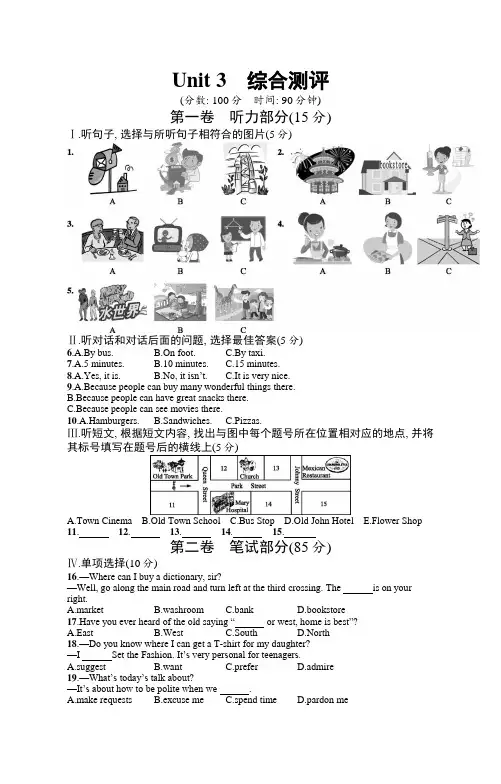
Unit3综合测评(分数: 100分时间: 90分钟)第一卷听力部分(15分)Ⅰ.听句子,选择与所听句子相符合的图片(5分)Ⅱ.听对话和对话后面的问题,选择最佳答案(5分)6.A.By bus. B.On foot. C.By taxi.7.A.5 minutes. B.10 minutes. C.15 minutes.8.A.Yes, it is. B.No, it isn’t. C.It is very nice.9.A.Because people can buy many wonderful things there.B.Because people can have great snacks there.C.Because people can see movies there.10.A.Hamburgers. B.Sandwiches. C.Pizzas.Ⅲ.听短文,根据短文内容,找出与图中每个题号所在位置相对应的地点,并将其标号填写在题号后的横线上(5分)A.Town CinemaB.Old Town SchoolC.Bus StopD.Old John HotelE.Flower Shop11.12.13.14.15.第二卷笔试部分(85分)Ⅳ.单项选择(10分)16.—Where can I buy a dictionary, sir?—Well, go along the main road and turn left at the third crossing. The is on your right.A.marketB.washroomC.bankD.bookstore17.Have you ever heard of the old saying “ or west, home is best”?A.EastB.WestC.SouthD.North18.—Do you know where I can get a T-shirt for my daughter?—I Set the Fashion. It’s very personal for teenagers.A.suggestB.wantC.preferD.admire19.—What’s today’s talk about?—It’s about how to be polite when we .A.make requestsB.excuse meC.spend timeD.pardon me20.One of the most ways to get around a city is by taxi.A.convenientB.seriousC.difficultD.expensive21.—Why did Tom to school?—Because he was late for class.A.rushB.requestC.acceptD.repeat22.Will you please tell us before you came to our city?A.where do you workB.where did you workC.where you workedD.you worked where23.—Could you tell me how to get to Xuzhou Railway Station, please?—.A.No, I couldn’tB.Don’t ask meC.Thank you all the sameD.Certainly. You can take the No. 1 bus24.You might feel it more difficult to speak than .A.polite; directB.politely; directlyC.polite; directlyD.politely; direct25.—Peter, is there anything else you want to know about China?—Yes, I am still wondering .A.how is the Chinese paper cutting madeB.how was the Great Wall built in ancient timesC.why the Chinese people like to play the dragon danceD.why do the Chinese people eat zongzi at the Dragon Boat FestivalⅤ.完形填空(10分)Suppose (假设) you are going to Boston, and you 26 the city before. If someone 27 you about the interesting places in the city, you 28 to get some ideas of what you will see. But you don’t have a 29 idea of where these places are or of how to find30. However, 31 someone has a map of the city and 32 you the main roads and buildings, you may say,“Oh, now I see. I can find my way with 33 trouble atall.”Working on math is somewhat (有点儿) like trying to find your way 34 a new city. Perhaps the words may tell you some information and you have 35 it, but you can’t see any clear road to the answers.26.A.are going to visit B.once visitedC.have never visitedD.have ever visit27.A.answers B.shows C.meets D.tells28.A.begin B.like C.learn D.refuse29.A.clever B.clear C.strange D.wrong30.A.someone B.something C.them D.it31.A.if B.though C.whether D.since32.A.helps B.gives C.passes D.shows33.A.not B.no C.some D.much34.A.of B.to C.in D.around35.A.thought over B.heard about C.written down D.talked withⅥ.阅读理解(30分)AI was in a strange city and I didn’t know the city at all. And what’s more, I couldn’t speak a word of the language. After having spent the first day in the town center, I decided to lose my way on my second day, since I was sure that this was the better way of getting to know the strange city. I got on the first bus in the morning, rode on it for several stops, and then got off and walked on. The first two hours passed happily enough. Then I decided to turn back to my hotel for lunch. After walking about for some time, I decided I had better ask the way. The trouble was that the only word I knew of the language was the name of the street in which I lived and even that was pronounced badly.I stopped to ask a friendly-looking newspaper seller. He smiled and handed me a paper.I shook my head and repeated the name of the street and he put the paper into my hands. I had to give him some money and went on my way. Then I met a policeman. I asked him at once. The policeman listened to me carefully, smiled and took me by the arm. There was astrange look in his eyes as he pointed left and right and left again. I thanked him politely and began walking on.About an hour passed and I found that the houses were getting fewer and green fields could be seen on either side of me.The thing left for me to do was to find the nearest bus stop.36.The writer preferred to walk back to his hotel at first because .A.he had no money to buy a ticketB.he wanted to lose himself in the cityC.he tried to know the city in this wayD.it was late and there were no buses passing by37.The newspaper seller .A.didn’t know the wayB.thought the writer wanted a paperC.helped him find the hotelD.didn’t want to take the money38.What was the writer’s real trouble?A.He was tired and hungry.B.He didn’t know the language.C.He forgot the name of the street.D.He took the wrong bus and found himself in a strange place.39.The policeman .A.wouldn’t like to tell him the wayB.told him to take a busC.couldn’t understand the writerD.told him to walk on40.Which of the following is TRUE?A.The writer had to walk back on foot.B.The writer was ready to go back by bus.C.The writer had to stay in the country for the night.D.The writer followed the policeman and returned to the town center.BWe all know that the British people love their manners(礼仪). They are part of their national identity (特性), as well as having fish and chips and complaining about the weather. Recently I read online that they say “sorry” up to eight times a day.After some research I have not been able to find any specific reasons why they are like this. I suppose, for centuries, manners, including how they behave at table and talk to other people have been one of the differences between the lower and upper classes and those manners show their social classes. Britain has traditionally been a quite conservative (保守的) country. There are many articles suggesting that their seemingly polite attitude of always saying “please” and “thank you” is quite false because it is impossible for a person to always feel that he or she wants to thank someone or say “please”.Maybe it is for this reason that people are going one of two ways: they are too polite and hold back their feelings or they are not polite at all and express their true feelings directly. Some British people are tired of pretending that they are always happy and having to please others. But sometimes because they feel they have to be polite, they are prevented from saying what they truly think.41.What don’t the British people often do?A.Eat fish and chips.B.Have no quite good manners.C.Be polite to others.D.Talk about the weather.42.What do the British people say up to eight times every day?A.Hello.B.Thank you.C.I don’t know.D.Sorry.43.What does the writer think are the reasons why the British people are so polite?①The upper classes should have good manners.②They have learned much about politeness at school.③They like to hold back their true feelings.④They are not honest at all.A.①②B.③④C.①③D.②④44.What does the underlined word “pretending” mean in Chinese?A.打算B.假装C.想象D.体验45.What is the best title of this passage?A.British people are too politeB.British people should not be so politeC.How to learn the British mannersD.It’s time to change our mannersCBeing polite is very important. (1) If you are polite to others, they will be polite to you.In English there are many words to show your politeness; the use of “sir” and “madam”is not an important one. These words are used far more rarely than we think. In Britain, it is unusual for someone in the street to say “Excuse me, sir. (2) Can you tell me the way to the station? ”The people who use the word “sir” in this way are usually expecting some money for a service—a taxi or a waiter. For example,“That will be $12, sir. Thank you!”The word “please” is used everywhere in Britain. (3) Many visitors don’t know when to use “please”. When they go into a cafe they say “A coffee.”or “I want a coffee.”or even “Can I have a coffee?”(That might be really alright in their own languages). However, (4) it seems that they are impolite! Just adding a simple “please” would make it better —“A coffee, please.”or “I would like a coffee, please.”It is better and safer to always use “please”!Let’s look at polite ways of asking questions. Instead of a direct question we often use “Can you” and “Could you” before we say what we want. Look at these examples, which are from a normal conversation at home between husband and wife:“Can you park your car over there, please?”“Could you move the table against the wall, please?”“Could...?” is a little more polite than “Can...?”, but both questions contain the word “please”.If you are not a native English speaker, then to use “Can...?” and “Could...?”to express a request is wise. In fact, you can be even more polite:“Sorry, could you tell me the way to Oxford Street, please?”“Sorry, could you tell me your name again, please?” (5) it’s, with, the, word, request, very, common, to, start, a,“sorry”.If you ask for help, try “I’m sorry to bother you, but could you help me, please?”You might say to a friend “Hey John, lend me $100, will you?”But you couldn’t say this to somebody you do not know well.阅读短文, 根据要求完成短文后面的问题。
Unit 3 综合水平测试(满分120分,考试时间100分钟)一、听力理解(本大题分为A 、B 、C 、D 四部分,共30小题,每小题1分,共30分)A .听单句话(本题共5小题,每小题1分,共5分)根据所听句子的内容和所提的问题,选择符合题意的图画回答问题。
(A )1.What does Li Ming like?A. B. C.(B )2.How does the speaker usually go to school?A. B. C.(B )3.How do the speaker get to the hospital?A. B. C.(A )4.What place does the speaker ask?A. B. C.(C )5.Where did the guest want to go?A. B. C.B .听对话(本题共10小题,每小题1分,共10分)根据所听对话内容,回答每段对话后面的问题,在各题所给的三个选项中选出一个最佳答案。
听第一段对话,回答第6小题。
(A )6.Where did the conversation happen?A .In a street.B .In the bookshop.C .In a tall building.听第二段对话,回答第7小题。
(B )7.Where does the woman want to go?A.A library. B.A bank. C.A post office.听第三段对话,回答第8小题。
(A)8.How will the man probably go to the store?A.On foot. B.By bus. C.By train.听第四段对话,回答第9小题。
(A)9.Does the man go to the third floor on foot every day?A.Yes,he does. B.No,he doesn't. C.We don't know.听第五段对话,回答第10小题。
Unit 3 标准检测(时间:100分钟满分:120分得分:________)二、单项填空(本大题有20小题,每小题1分,共20分)在每小题的四个选项中,选出可以填入空白处的最佳答案。
( )26.—Must I be home before eight o'clock, Mum?—No, you ________.But you have to come back before ten o'clock.A.needn't B.can'tC.mustn't D.may( )27.—Tom wants to know if you will have a picnic tomorrow.—Yes.But if it ________, we'll play chess instead.A.will rain B.rainedC.is raining D.rains( )28.He suggested that you should ________there tomorrow.A.going B.went C.goes D.go( )29.—I like the dress, but I'm ________ I haven't got enough money.—Don't worry.I don't mind ________ you some if you like.A.afraid; lending B.glad; lendingC.afraid; to lend D.glad; to lend( )30.—Show me the map, please.I wonder ________.—Look, it's here, in the east of China, near Taiwan Province.A.where is Diaoyu IslandB.where Diaoyu Island isC.what is Diaoyu Island likeD.where Island is Diaoyu( )31.—Sally, I went to the concert last night.How big the symphony hall is! —So it is.It is ________ to hold more than one thousand people.A.big enough B.enough bigC.too big D.too small( )32.I'm not sure whether he will come here, because it ________ his feeling. A.stands for B.depends onC.lives on D.agrees with( )33.We joined them________ Xiao Ming.A.predicting B.includingC.serving D.announcing( )34.On the way ________ the mountain village, we found the local houses different from ours.A.to B.by C.at D.on( )35.Her mother goes to work ________ bus every morning.A.by B.at C.on D.in( )36.—I'm doing a survey.Could you tell me ________?—Sure.I usually go to work at 7:00 a.m.A.why you go to workB.how you go to workC.when you go to workD.who you go to work with( )37.—You look ________.What's up, sir?—I can't find my ticket, but it's time to check in.A.sleepy B.hungryC.tired D.worried( )38.—That actor often joins in different activities in Beijing.Do you know ________?—For 5 years.A.how soon he will come backB.how long he has stayed thereC.how long has he stayed thereC.how often does he go there( )39.—How can I get more information about the donation to Ya'an?—You can email Mr.Wang ________ yaanearthquake@.A.on B.in C.at D.by( )40.It is important ________ people ________ learn team spirit.A.of; of B.of; toC.for; to D.to; to( )41.Please hold on to your dream ________ one day it comes true.A.if B.until C.unless D.though( )42.Julie's father ________ to London last month.He ________ there three times.A.went; had gone B.has gone; has beenC.went; has been D.has been; had gone( )43.—I feel stressed from time to time.Could you give me some advice?—________ sharing your worries with your parents?A.Why don't you B.How aboutC.Why not D.Would you like( )44.—Would you mind ________ in the dining hall?—Of course not.A.not to smoke B.not smokingC.to smoking D.smoke( )45.Students should learn how ________ problems.A.solve B.solvingC.can solve D.to solve三、完形填空(本大题有10小题,每小题1分,共10分)通读下面短文,掌握其大意,然后在各小题所给的四个选项中,选出一个最佳答案。
人教版英语九年级Unit3 Could you please tell me where the restrooms are?单元测试题一、用单词的适当形式完成句子。
A)1.Go to the(twelve)floor and turn right.2.Can you finish it(quick)?3.The man always wears a suit.(normal)4.I have a little money ,so I want to buy(expensive) shirt.5.This supermarket is crowded, but that one is( crowded).B)1.Tom is excited the rides.(try)2.The girl started (run).3.Our monitor suggest us(go) on the new rides.4.The staff(be)dressing up as cartoon characters.5.The mother told her son(request)politely.1.1t is important(know)how to ask for help politely.7.The young man spent two hours(communicate)with her.8. I look forward to(watch) the video .9.Do you know where(get)some stamps?10.Could you tell me where there ' s a place(eat)?C)选词完成句子seems, to trouble, speaker, much more polite, possibly, depend on1.Little children have to their parents.2.This question sounds than that one.3.Trying the new ride to be exciting.4.Could you tell me the way to the hotel?5.1' m sorry 5y6.Good usually asks questions politely.二.选择题。
Unit 3达标测试卷Ⅰ.听力(共20分)(Ⅰ) 听对话,选择正确的答案。
每组对话读两遍(每小题1分,共5分) 1.What kind of book is he looking for?,A) ,B) ,C) 2.How does Jeff go to work?,A) ,B) ,C)3.Where is the girl going?A.The Children's Park.B.The People's Park.C.The Beihai Park.4.Where is the nearest restaurant?A.Near the bookstore.B.Beside the post office.C.Behind the post office.5.When will the movie begin?A.At 6:45. B.At 6:50. C.At 6:55.(Ⅱ)听对话,选择正确的答案。
每段对话读两遍(每小题1分,共10分) 听第一段对话,完成第6至7小题。
6.What does the man think of the buses to the People's Square? A.Clean. B.Crowded. C.Empty. 7.Which bus can the woman take?A.No.864 bus. B.No.846 bus. C.No.807 bus.听第二段对话,完成第8至9小题。
8.What's wrong with the woman?A.She had a toothache.B.She had a headache.C.She had a sore throat.9.What is the relationship between the woman and the man? A.Mother and son.B.Teacher and student.C.Friends.听第三段对话,完成第10至12小题。
第三单元检测卷时间:120分钟满分:150分班级:________姓名:________得分:________ 第一部分听力(共2小节,满分30分)第一节听力选择(共15小题,每小题1.5分,共计22.5分)A.图片理解请听句子,从A、B、C中选择与句子意思相符的正确图片。
(听两遍) ()1.A. B. C.()2.A. B. C.()3.A. B. C.()4.A. B. C.()5.A. B. C.B.小对话理解请听小对话及问题,从A、B、C中选择正确的答案。
(听两遍)()6.A.On Center Street. B.On River Street. C.On Main Street.()7.A.Yes,he does. B.No,he doesn't. C.No,he does.()8.A.About 10 minutes. B.About 15 minutes. C.About 20 minutes.()9.A.At the mall on Golden Street.B.At the mall on Zhongshan Street.C.At the mall on Garden Street.()10.A.The second floor. B.The third floor. C.The fourth floor.C.长对话理解请听长对话,根据其内容,从A、B、C中选择能回答所给问题的最佳答案。
(听三遍)()11.What are they going to do?A.Go swimming. B.Go on a trip.C.Climb mountains.()12.Where are they going?A.The park of Beijing. B.Tianshan.C.The Palace Museum.()13.What can they do there?A.They can take photos.B.They can see many works of art there.C.They can see some movies.()14.How will they go there?A.By bus. B.By train. C.By underground.()15.What time will they meet?A.At eight. B.At nine. C.At ten.第二节听力填空(共5小题,每小题1.5分,计7.5分)第二部分语言知识运用(共3小节,满分40分)第一节单项选择(共15小题,每小题1分,共计15分)从A、B、C中选出最佳答案。
()21.—Excuse me,where does Lucy sit?—She sits ______ Billy.But she is not there now.A.for B.beside C.from()22.We live near a big supermarket,so it's very ______ for us to do some shopping. A.noisy B.boring C.convenient()23.We have got enough time to pack our clothes.There's no need to ______. A.rush B.laugh C.help()24.—His answer is wrong.Can you give me a ______ one,Jerry?—Sorry,I'm afraid I can't.A.simple B.deep C.correct()25.—Have you got any ideas what we are going to do tomorrow?—Yes,I ______ a tour of the museum.It will be great.A.hate B.suggest C.warn()26.Although the customer is rude (粗鲁的),you should speak to him ______. A.politely B.clearly C.quickly()27.—Is the question difficult?—It depends on ______ you ask.Jack must know the answer.A.whom B.where C.when()28.I was upset because she didn't say hello to me when she ______.A.gave up B.passed by C.waited for()29.—May I come in?I'm sorry I'm late.—Come in,please.But could you tell me ______?A.how do you come to school B.what were you doingC.why you are late()30.—Let's go to Water World for a trip tomorrow,OK?—______ Where did you suggest going?A.Pardon me? B.I don't know. C.I agree with you.()31.Could you please ______ me a hand?I need your help.A.to give B.give C.giving()32.Can you please tell me how ______ the post office?A.to find B.can I find C.to finding()33.I ______ some of my free time playing basketball for my school team.A.spend B.cost C.take()34.This morning my mother asked me ______.A.why he is not here B.where Julia went last weekendC.what time is it()35.I like Chinese food,______ noodles and dumplings.A.such B.such as C.for example第二节完形填空(共10小题,每小题1.5分,共计15分)阅读短文,根据其内容,从A、B、C中选出最佳答案。
Do you like visiting parks?The following three might be the ones that you are __36__ in.Hyde Park,__37__ royal park of the UK,lies in the center of London,next to Green Park.It was built to be a royal park in 1536.About one hundred years later,the park was __38__ to the public.Speakers' Corner in Hyde Park is __39__ all over the world.__40__ can make a speech there on Sunday afternoons.Central Park is a manmade park in the center of Manhattan,New York.It took about 15 years __41__ the park and in 1873 it was open to the public.__42__ 21 playgrounds and 2 zoos,Central Park is a wonderful place for children __43__.Banff National Park,the largest park in Alberta,Canada,was open in 1885.The park is as __44__ as 6,641 km2.Whether by car,boat,bus,bike or on foot,you can enjoy the mountains,lakes,as well as the plants and wild animals.There're 3 famous ski areas in the park,which attracts __45__ people to come every winter.()36.A.interesting B.interested C.relaxed()37.A.the biggest B.bigger C.biggest()38.A.popular B.open C.closed()39.A.different B.famous C.convenient()40.A.Someone B.Everyone C.Anyone()41.A.to build B.building C.built()42.A.For B.From C.With()43.A.to have fun B.have fun C.having fun()rge B.larger C.largest()lions B.millions of C.million of第三节口语交际(共5小题,每小题2分,共计10分)情景七选五请阅读下面一段对话,根据其情景,从方框内七个选项中选出能填入对话的五个选项。
W:Excuse me.46.______M:Yes.Go down this street and turn left when you see a shoe store.Go on walking and you will see it on your right.W:Thanks.47.______M:Yes.It opens at 9:00 a.m.and closes at 8:30 p.m.W:Are there any cookbooks in the bookstore?M:48.______W:What about children's books?M:Hmm,they are on the fifth floor.W:Thank you.You are very familiar with the bookstore.M:49.______W:How long does it take me to walk there?M:50.______W:Thank you very much.A.I often read books in the library.B.Yes,they are on the third floor.C.I often go there in my free time.D.Could you tell me how I can get to the nearest bookstore?E.About 10 minutes.F.Do you know which bus I should take?G.Do you know if it is open now?第三部分词汇与阅读(共3小节,满分55分)第一节阅读理解(共20小题,每小题2分,共计40分)请阅读材料A、B、C,根据其内容选择填空;请阅读材料D,回答问题及翻译画线部分的句子。